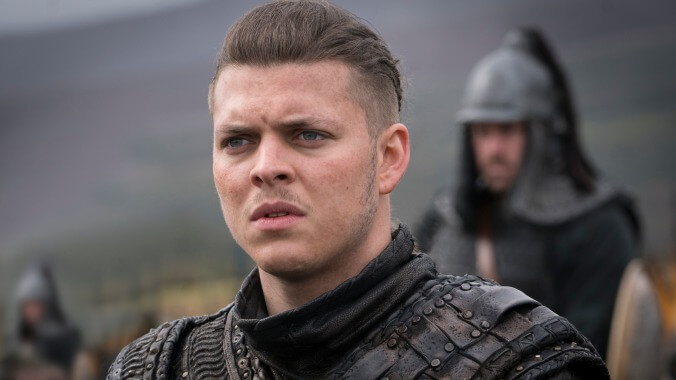As endings go—especially for the men and women of the show’s ninth century Norse protagonists—“The Best Laid Plans” provides some fitting and abrupt goodbyes. Harald Finehair stays locked into his unshakeable vision of himself as king of all Norway right to the end, dying heroically amidst a hail of blows from the unstoppable Run invaders attacking the beachhead outside his capital. We lose a little-seen jarl who, among the many who supported Harald to the throne over Bjorn, is the only one to show up to repel the invaders.
And Bjorn Ironside.
Cut down in his berserker rage by brother Ivar in the last, dying resistance to the Rus landing force, Bjorn dies. All through the episode, the buildup and payoff to the massive battle scene that forms the second half of “The Best Laid Plans” has intercut with isolated scenes of Bjorn—either himself or in lonely conversation with Ivar—on the beach looking out to where the Rus’ massive armada is inevitably coming. It’s a storytelling device creator Michael Hirst has used before, and it’s as effective here as in the past, the poetic license of the interstitial interludes bringing an epic sweep to the conclusion (for some) of a story suited to (and taken from) half-hyperbolic oral tradition.
“I have made many mistakes and I have failed, but this time I will not fail,” Bjorn tells his little brother, “This time I will win. The gods are with me. I will defeat you.”
“You are wrong. The gods abandoned you a long time ago, my brother,” responds Ivar, not unkindly. “There’s no way you can win. Believe me, no way you can win.”
Bjorn Ironside loses in the end, Hirst having skillfully set us up in several ways to imagine that he won’t. In mapping their respective battle plans (Ivar’s complete with little scale models), we see Ivar and Bjorn attempting to get inside each others’ heads, both knowing that—for narrative symmetry if nothing else—it is they who will determine the outcome. When Bjorn’s compatriot Erik (something of a doom-and-gloom bummer all episode), asks of of the Rus’ transfer of soldiers from their light ships to small landing barges, “What are they doing,?” Bjorn responds, “What I expected.” Later, after a first line of the Norse defenses appears to fall under the sheer numbers of the Rus, we see Bjorn watching impassively, and then walking slowly away, the filmmaking shorthand for someone about to unconcernedly spring a well-devised trap.
The Rus’ shattering of the beach defenses sees them forced to traverse a steep sandy hill toward the Norse archers, only to be greeted by a fusillade of deadly, spiky rolling balls that trample and skewer them by the score. Then, for added optimistic chicanery, archers light the pitch-covered projectiles aflame with fire arrows, burning scores more. A smaller secondary Rus force (led by Ivar, Hvitserk, and Oleg in a ship emblazoned with a bloody Christ figurehead, complete with deadly-looking throned crown) runs into a Bjorn-designed floating, bristling (and ultimately on fire) barricade, Gunnhild leading the Viking warriors to board the halted Rus ships. Meanwhile, we sit in anticipation, knowing that Bjorn had dispatched Erik earlier to the balking Norse leaders (apparently unsatisfied with Harald’s empty election promises), instructing him secretly, “Send word in my name, not Harald’s name.” It is—on both Ivar, Bjorn, and Hirst’s parts—a lovely, bloody piece of gamesmanship.
But someone had to lose, and, it’s Bjorn. Finally, he wasn’t necessarily outsmarted by Ivar—despite a Rus incursion into Harald’s domain via a daringly impossible-looking mountaineering assault up what looks like the Cliffs Of Insanity—as defeated by the full weight of his failures. When he speaks of their father’s dreams and plans, Bjorn, as ever, cannot convince Ivar (or us) that he truly understands what those are—or that he could carry them out if he did. Alexander Ludwig’s Bjorn was—as Erik told him—as famous and renowned as his father in the years since Ragnar’s death, but Bjorn is right not to believe it. As much as we are conditioned to imagine that this eldest son of Ragnar will finally, improbably pull out a Ragnar-worthy gambit to truly anoint himself Ragnar’s heir, his inability to do so lands with an inevitable sadness. Bjorn Ironside was, like his father, a husband, father, explorer, dreamer, and king. But he was never Ragnar, and he knew it, never as surely as when his blood runs out over the cold sand at the hand of his more ingeniously ambitious brother.
Vikings is best in times like this, where we’re left wondering at what we’ve just seen rather than sighing as we take in another rote installment of threadbare romantic and political intrigue in leather and chain mail. From the start, “The Best Laid Plans” stings with some of the old Vikings storytelling magic, Bjorn and Harald’s alliance, planning, and preparations told in bracingly expedient montage. The intrigues we do get before the carnage begins are equally unsettling in their raw, ugly depiction of this world in ways the series was wont to incorporate. Gunnhild loses her baby with Bjorn, her repeated rebuffs of the solicitous Erik’s attempts to get her to rest from the strenuous preparations for war ending in her screaming and toppling from a dock into the bay. When she consoles Bjorn, it’s with the unsentimental language of pre-war propaganda (“We lost a child, but it would be far worse to lose a country.”), but her solo scene burying the impossibly tiny wrapped bundle of her miscarried son under a pile of stones rings with Ragnar’s long-ago lonely farewell to his dead daughter, Gyda. “But I will wait here a while,” Ragga Ragnars’ Gunnhild chokes out as she lays the rocks on the grave, “in case you are lonely.”
And then Harald rapes Ingrid. The specter of sexual assault was always a looming question from the start of Vikings, a series set in a world where (the propaganda of the invaded notwithstanding) such practices were infamous. The series has largely shied away from the act, thankfully, implicitly granting that those characters whose vision of the human condition was far-sighted enough to follow would also be averse to individual depredation. Rape was for villains. And those conflicted characters whose villainous and anti-heroic natures were always at war (Rollo, Harald) were ultimately left aside in the broad sweep of potential heroism. Harald was already a kidnapping rapist (having absconded with Lagertha’s lover Astrid), so his sudden dispatch of men to bring Bjorn’s second wife to his bedchamber smacks of his wonted, runty inadequacy. Still, it’s an ugly, ugly scene, redeemed only by Ingrid (Lucy Martin) defying any attempt by the pawing and smooth-talking Harald to force her to accept her fate (and possibly wind up as his queen, should the battle turn his way). Ingrid is granted her own mental escape, like Bjorn’s, when we see her approaching the water’s edge, gowned, garlanded, and serene, but in the end, she’s left to stumble, bloody and weeping, into the deposed Olaf’s arms on the dock of the deserted town as the war rages in the distance. The old man, taking her in, can only console her, crying, “Oh my poor child. Weep for all of us. Weep for our ruin.”
In the end, who is left to gather up the scattered and mysterious fragments of Ragnar Lothbrok’s enigmatic legacy and piece them into something worth saving? (Or, if you like, watching.) Erik (with his significant red hair), greets the dying Harald’s benediction, “Find yourself another home, skógarmaðr,” by scooping Harald’s ill-gotten crown out of the blood and mud and fleeing into the chaos. Gunnhild, bested by Oleg (to be fair, she’s just miscarried), escapes by diving into the icy water and swimming away, Ivar’s deadly throwing knives having been deflected by some blundering warriors. We don’t see the end of Olaf and Ingrid, but their prospects aren’t good, and they’re hardly poised to take on larger roles going forward. Ubbe and Torvi are facing intrigues of their own as they set out alongside the untrustworthy Kjetill and duplicitous Othere-Athelstan to discover new lands to the west. Ivar and Hvitserk, the last remaining sons of Ragnar, have seemingly thrown in with the Christian conquerors, Ivar having told the disbelieving Bjorn (in Bjorn’s mind, at least), that destroying the old gods was Ragnar’s dream all along. There’s always the possibility that Hvitserk is still harboring some revenge plans against Ivar, but Marco Ilsø has made the perpetual also-ran’s heel turn seem as permanent as it’s been rushed. Noway is shattered, the gods are endangered by a fanatical Christian whose mission (or so he claims) is to bring about “the end of paganism,” and the sole surviving driving force in Vikings’ narrative has been, finally and, it would seem, utterly swept off the map.
Of course, there’s one character left whose absence all season has only left his own confused and deflected legacy looming larger. Floki the boatbuilder is still missing, his own fanatical devotion to his gods having been apocalyptically shaken—both by the short-sighted failings of his chosen “pure” Norse settlers, and, seemingly, by the trembling, violent eruption of the Earth itself. Now, with his hated Christian god standing triumphant over his land, the scene is set for the final major player left on Vikings to make his move—whatever it may be.
Stray observations
- Hvitsrk remains the least satisfyingly drawn son of Ragnar. (I mean, Sigurd was a drip, but he went quick.) Here, scheming with Ivar (they may or may not still be conspiring with Dir to overthrow Oleg), he tells his brother, sneering, “A lot of my life I’ve fought against my fate but now I’m resigned. I’ve committed myself to the destructive element.” Even Ivar raises an eyebrow at whatever’s going on in Hvitserk’s head at this point.
- Speaking of raising eyebrows, prior to the invasion, Ivar is seduced in the middle of the night by Katia, who leads the shirtless and flowing-haired Ivar into a secret chamber where she dresses up like a blonde-wigged angel and mounts him while he protests that he can’t, you know. Just wanted to type that sentence out to see if it’s any less silly. It is not.
- Harald: “We have some misgivings.” Bjorn: “Who doesn’t, being human?”
- While Bjorn supervises his defenses as the Rus boats are first spotted on the horizon, Harald is still naked and alone in the bed where he’d raped Ingrid. Hearing the far-off horns announcing the impending battle, he reaches for his crown and lays it upon his own head.
- As the innumerable boats approach, one Viking warrior at the battlements starts up a stirring Norse song. No one joins him.


